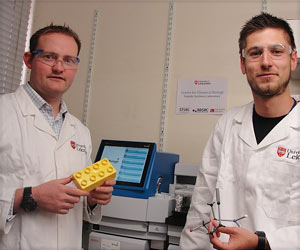Researchers have developed two new anticancer peptide vaccines and two peptide inhibitors as part of a larger peptide immunotherapy effort.

All four agents elicited significant anti-tumor responses in human cancer cell lines and in animal models. The studies suggest that combining two peptide agents that target different cell receptors can significantly boost their effectiveness and might prevent or overcome the drug resistance that often occurs with standard single-drug treatments that target HER-2.
"Combining these novel immunotherapy peptides could significantly improve response rates and rates of durable remissions for the multiple types of cancer that depend on EGFR, HER-2, HER-3 or IGF-1R signaling," says principle investigator Pravin Kaumaya, PhD, director of the division of vaccine development at the OSUCCC – James. IGF-1R – the insulin-like growth factor receptor 1R – plays a crucial role in cell growth, proliferation, differentiation and development and is overexpressed in breast, pancreatic and colon cancers.
HER-3 – or human epidermal growth factor receptor 3 – is frequently upregulated in cancers that overexpress EGFR (also called HER-1) and HER-2. "We believe that blocking HER-3 might provide a route for overcoming resistance to agents that target EGFR or HER-2," says Kaumaya, who is a professor of obstetrics and gynecology, of molecular and cellular biochemistry, and of microbiology at Ohio State. Antibodies elicited in an animal model by the two vaccines inhibited cancer-cell proliferation and receptor activation, and induced cell death by apoptosis and antibody-dependent cellular cytotoxicity (ADCC). They also significantly inhibited tumor growth in animal models. Similarly, the peptide inhibitors blocked cancer-cell proliferation and receptor activation, and induced cell death and slowed tumor growth in animal models.
"These two studies independently identify important HER-3 and IGF-1R vaccine epitopes that elicited significant anti-tumor responses in a variety of human cancer-cell lines and in animal models," Kaumaya says. "They also provide additional evidence that combining these agents has synergistic antitumor effects in various cancer types that express HER receptors." For this study, Kaumaya and his colleagues used several cancer cell lines (two breast, TNBC, colon and pancreatic) and two animal models to evaluate the effectiveness of the HER-3 and IGF-1R inhibitors alone and in combination with HER-2 and EGFR.
These studies point to rational combination immunotherapy for a variety of cancer types that are more efficacious than the use of single-agent vaccine candidates. Key technical findings included:
Advertisement
• Combining the HER-3 vaccine and IGF-1R inhibitor reduced cancer-cell proliferation by 60 percent or more versus a reduction of 40 percent using the HER-3 inhibitor alone and of 30 percent for IGF-1R alone;
Advertisement
• Combining HER-3 with IGF-1R showed significant antitumor effects in breast, pancreatic and colon cancers, and combining the HER-1 and IGF-1R vaccines show enhanced antitumor responses in triple-negative breast cancer and pancreatic cancer.
"We believe that our novel immune-stimulatory strategies using peptide vaccines and inhibitors hold the promise of durable clinical benefit for high-risk, recurrent, refractory and metastatic cancers," Kaumaya says.
Source-Eurekalert












